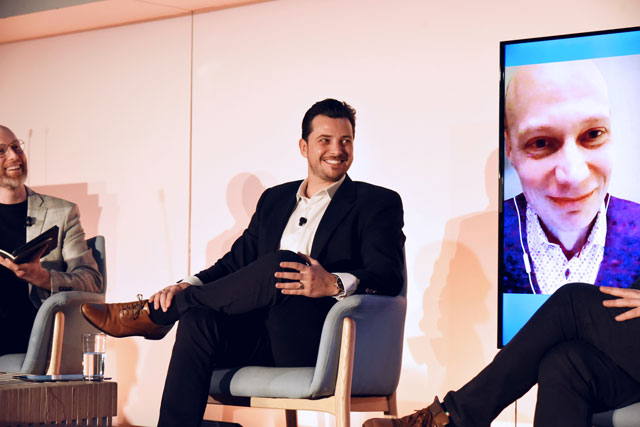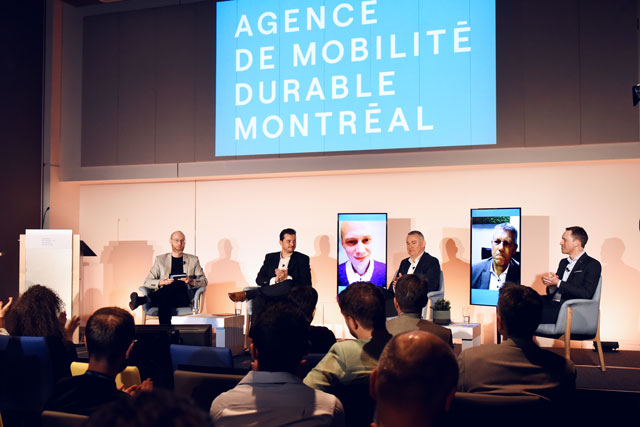Parking sharing: innovating to optimize the use of urban spaces - panel of experts
The curbside is often one of the most crowded parts of public space. Growing demand means that we need to start considering how best to use and share the curbside, and how we can integrate curbside and off-street parking management.
Parking sharing offers a promising solution for maximizing off‑street spaces. Parking sharing consists of making off-street parking available to different groups of users at different times of day, cutting down on the amount of time that parking spaces go unused..
The Agency brought together a panel of five national and international experts to discuss the issue. Hosted by columnist Marc-André Carignan, the event also featured:
- Gautier Caland. Director of Innovation & Marketing, Indigo Group
- Eric Diserbeau. Director of Innovation & Marketing, Indigo Group
- Eric Dubois. General Manager, Parking Brussels
- Mathieu Nicaise. Strategy & Innovation Senior Officer, Brussels Intercommunal Transport Company
- Antoine Sambin. Head of Mobility Strategies, Agence de mobilité durable
The role of off-street parking
Our five experts agreed that parking sharing is a great way to rethink parking, optimize the use of public space and encourage other applications. “Sharing helps us meet the need for parking even as we reduce it as much as possible and make space for other uses,” explained Eric Diserbeau.
Antoine Sambin showed how an Agence de mobilité durable project employs this strategy, allowing for a variety of uses. In the neighbourhood of Griffintown, the small number of on-street parking spaces is boosted by off-street spots through a partnership with ÉTS (École de technologie supérieure). ÉTS makes parking spaces available to residents in evenings and on weekends when staff and students aren’t at the school. According to Antoine Sambin, “The main point is finding these complementary uses so we can make better use of existing spaces.”
Moving toward off-street parking spaces is the cornerstone of this mobility strategy. In the Brussels area, the Good Move mobility plan will eliminate many on-street parking spaces. As Eric Dubois said, “Sharing is both an opportunity and a necessity.”.
The experts underscored that the public often has little awareness of off-street parking spaces and are under the impression that few alternatives exist. The experts agreed that it’s crucial not only to establish partnerships with companies and public institutions that have underused parking spaces, but also to make drivers aware that these spaces are available.
Gautier Caland explained that uncertainty around how off-street parking works is sometimes a barrier for users. Introducing planning and safety quality standards could have a positive impact on their experience. “A high-quality customer experience is an important factor in the success of sharing,” said Antoine Sambin. He added that, when customers know when, where and how much it costs to park and how many spaces are available in real time, it can steer them away from on-street parking.

The advantages of parking sharing
“Sharing is empowering. It’s a great way to meet individual needs and create a much more inclusive city,” said Gautier Caland.
“One of the main goals and advantages of sharing is streamlining different uses,” added Antoine Sambin. “The alternatives are attractive. Sharing makes it possible to use off-street parking spaces and even curbsides for other things, going beyond individual parking to include things like car sharing, bike paths, parklets, patios, greenery and storage. Parking may have been designed for cars, but there’s nothing stopping us from thinking outside the box.
Conversations about parking are often contentious, even heated, but sharing has positive impacts on urban mobility, as Mathieu Nicaise explained. Only a year after the Good Move initiative was launched in Brussels, car traffic had gone down 20%, while bicycle transportation had increased by 20%. “We created a new normal,” he observed. “The way we do things now feels like it’s how things should be, and what we did in the past seems completely absurd and anachronistic.”
From challenges to solutions
The panellists noted that significant barriers to sharing include municipal regulations, competitive rates for on-street parking and the fact that residents take it for granted that the curbside belongs to them. The panelists highlighted the issues facing sharing initiatives, such as mobility data and public-private partnerships. However, they said, with every challenge comes a potential solution.
“There is a considerable lack of mobility data in terms of characterizing usage, but that’s exactly where we can find efficiencies for sharing and diversifying the use of public space,” noted Mathieu Nicaise.
According to Eric Diserbeau, this kind of data is a rarity even in Rennes, a city with its own parking observatory.
However, being able to collect and effectively share mobility data is a significant challenge. According to our mobility experts, being better equipped to understand what the public needs is crucial for planning parking sharing.
Gautier Caland explained that “Parking is ingrained in our mobility culture in North America, and it has become a major revenue source for adjacent buildings.” He believes that it’s not that the private sector lacks the will to move forward, but that there’s a fear of losing revenue on real estate assets, which could be an issue for property owners. The experts said that these assets are underused and undervalued. We need to rethink how we approach parking.
Gautier Caland explained that adapting by easing regulations would make it possible to maximise usage. With less traditional uses, like rental for events, organic gardening, or logistics or data centres, for example, it’s possible to share space and better meet the needs of many different groups of people.

A dynamic concept
Making off-street parking easier and more accessible might sound contradictory to some people—doesn’t it encourage driving?
For Gautier Caland, there is no such thing as a perfect solution, and what matters most is giving people the support they need as they change their behaviour. We can convince them to consider going carless, as long as we give them alternative solutions. He thinks positive efforts are needed to encourage the transition. “Our initiatives shouldn’t make people feel guilty about keeping their cars, as their options are sometimes limited,” he noted.
Changing people’s behaviour can take many years. “It’s a dynamic concept that no one fully understands,” according to Mathieu Nicaise. “The urban ecosystem is full of nuance and paradox. We need to be humbly aware of these variables and that there is no magic solution.”

